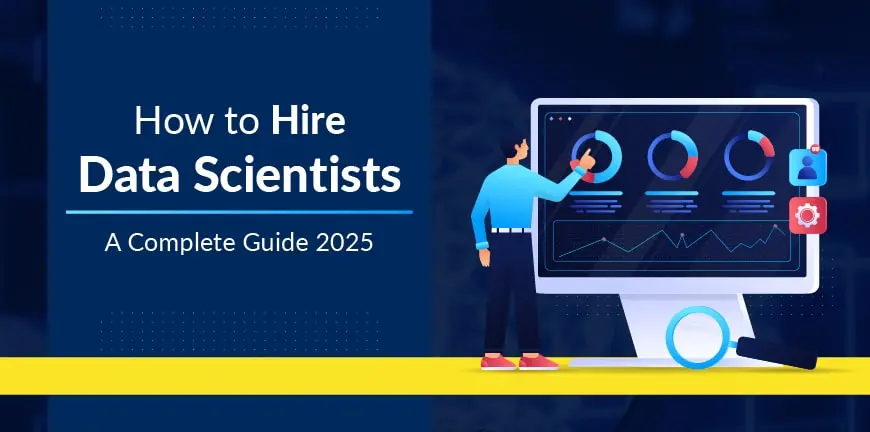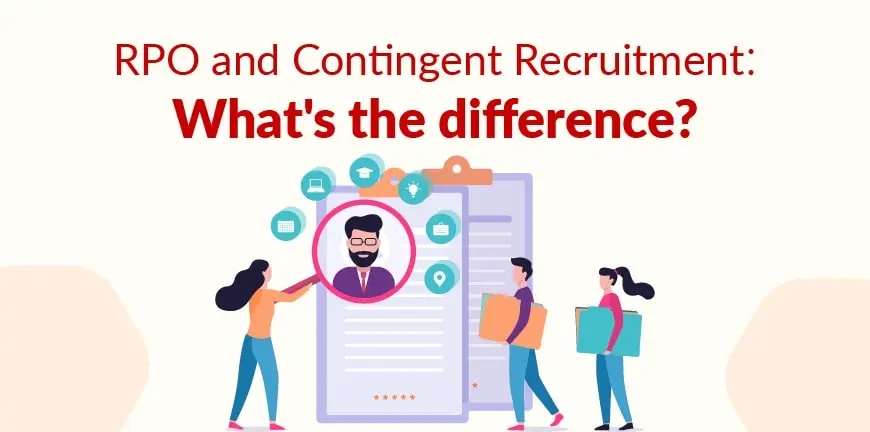
What is Resource Augmentation? How Does it Work?
31/10/2024
A Step-by-Step Guide on How to Hire Data Scientists
01/11/2024- What is Recruitment Process Outsourcing?
- What is Contingent Recruitment?
- What are the Benefits of RPO and Contingent Recruitment?
- What is the difference between RPO and Contingent Recruitment?
- What are the Pros and Cons of RPO?
- What are the Pros and Cons of Contingent Recruitment?
- Need help with your hiring process?
Every organization has distinct staffing or recruitment needs, depending on their business requirements. Engaging with an HR Outsourcing service can help in times like these. However, you must first figure out the type of staffing service you require, before you engage with one. While there are various types of staffing services like RPO, contract staffing, contingent recruitment etc. choosing the right one for your business is crucial. Talking specifically about RPO and contingent recruitment, its essential to know the difference between RPO and contingent recruitment before choosing the one that’s right for your business.
What is Recruitment Process Outsourcing?
Recruitment process outsourcing is the type of staffing model where you partner with a recruitment expert who actively takes on responsibility for every step of the hiring process including crafting job descriptions, sourcing and screening candidates, performing background checks, scheduling interviews to onboarding them with all the relevant paperwork.
RPO experts help companies with no or less in-house hiring expertise. With an RPO model, organizations can reap ongoing benefits even when they aren’t using their hiring services. How? RPO experts are present with the organization for a period of time, so they are highly scalable and can be called at any point of time, as and when you require their services. Additionally, with an RPO model, organizations can fill positions swiftly, in a shorter period.
What is Contingent Recruitment?
Contingent recruitment is a staffing model where the staffing agency provides organizations with a list of suitable candidates for their open positions. Usually, once the organization contacts the recruitment agency, they start their search for the right candidate. But why is it called contingent recruitment? Because the fees to be paid to the agency is contingent or dependant on successful candidate search and hiring. In case, the recruitment agency can’t find a candidate that the organization is happy with they don’t pay a single penny.
Contingent Recruitment is a great way to manage your budget effectively, and is one of the best options for startups, small industries in cases where the recruitment firm may offer a guarantee, but it didn’t work out the client will receive a refund.
What are the Benefits of RPO and Contingent Recruitment?
Although quite distinct as to how the recruitment process takes place, both the models’ various benefits that organizations can reap including:
- Cost effectiveness
- Scalability
- Access to the best talent
- Better candidate experience
- Swift hiring
- Access to modern HR technology that helps you stay up to date
- Advantage over competitors
- Better chances of hiring qualified candidates
- Redeployment
What is the difference between RPO and Contingent Recruitment?
Recruitment Process Outsourcing varies in many ways like-
1. Nature of the relationship with the organisation
RPO is a partnership between a company and the recruitment agency to manage the entire recruiting process for a certain period, during which the hiring needs of an organization may surge, reduce or not required at all depending on the seasonal needs. However, a contingent recruitment is a type of recruitment model where agencies fill open positions on a contract basis.
2. Focus
RPO is a strategic partnership where the focus lies on internal hiring strategies, while contingent recruitment is focused on providing suitable candidates.
3. Hiring strategy
In the contingent recruitment model, recruiters select from a pre-gathered list of candidates from their wide database, while RPO consultants try different approaches to find the best talent, including internal recruitment.
4. Responsibility
RPO service providers take full responsibility for the entire recruitment process from start to the end, while in contingent recruitment, the recruiters job ends after providing the candidate the organization requires.
5. Cost
RPO can be a bit more expensive than contingent recruitment due to the continuous involvement and strategic planning, while contingent agencies are only involved to an extent, up until they provide the right candidate to the organization.
6. Timeframe
RPO process may require a longer timeframe for implementation and execution, while contingent recruitment is a straightforward process where the recruiters have a gathered pool of talented candidates from which they can choose from and provide candidates at short notice.
7. Quality of candidates
RPO is slow but a stringent process where they are focused on delivering high-quality hires, while contingent recruitment leaves that out that responsibility and decision to the hiring organization’s team.
8. Scalability
RPO can scale its recruitment efforts to meet changing business needs, while contingent recruitment is often on an on-demand basis.
9. Relationship
RPO is a long-term partnership with the provider, while contingent recruitment is often a one-time transactional relationship with the staffing agency.
While both the staffing models have advantages, its important for organizations to choose the one that best suit their needs.
What are the Pros and Cons of RPO?
Some of the pros of choosing recruitment process outsourcing are-
1. Strategic recruitment approach
An RPO provider will help in developing a fool proof recruitment strategy as well as look into your internal processes that can help deliver better results. This will act as a long-term advantage, and you will see improved results in the future.
2. Better candidate experience
An RPO, as it as a more comprehensive approach, ultimately aims at providing better overall candidate experience. Job seekers will receive better communication, more focused interviews, and improved onboarding.
3. Employer branding
An RPO provider can help improve your organization’s employer brand by creating a positive candidate experience throughout the recruitment process. This can lead to better talent being attracted to your organization.
4. Reduced time-to-fill
RPO delivers faster results, which means organizations get the right person very quickly taking the pressure off hiring managers and reducing the risk of missing out on your dream candidate.
5. Reduced cost-per-hire
It is a streamlined recruitment process can offer cost savings, with lower spending on things like advertising and talent sourcing. This means a lower cost-per-hire every time you recruit.
However, every process, along with pros has cons as well, so does RPO. Some of the cons of the RPO are-
1. Higher upfront fees
RPOs are a bit more expensive than the other staffing models due to the vast services they provide apart from finding the right candidates.
2. Lesser ownership
Outsourcing your entire recruitment process to an RPO provider may lead to loss in control over the process, which is why you must engage with a partner you can trust.
3. Communication issues
Communication is key in all relationships. You must be able to communicate well with your RPO consultant in order to reap the best out of it, otherwise, it may not work.
What are the Pros and Cons of Contingent Recruitment?
Contingent Recruitment comes along with a lot of Pros. Here are some main benefits of engaging with a contingent recruiter-
1. Smaller upfront fee
The fee an organization has to pay the recruiter is contingent or dependant on making a successful hire. You only pay for a candidate you hire successfully.
2. Flexibility
Contingent recruitment offers greater flexibility when compared to other recruitment solutions, as it allows multiple agencies to compete to find the best candidate for the job.
3. Use of more than one agency
A contingent recruitment model allows other agencies to participate in search for a candidate. This can become advantageous as organizations get access to the best of best candidates.
4. Better response time
As recruiting agencies are competing with each other in their search for the best candidates, response time reduces dramatically.
Again, with the pros, there are some cons associated with contingent recruitment. They are-
5. Quality issues
Since this type of recruitment is based on success only, some organisations may prioritise presenting a large number of candidates rather than focussing on presenting the select few who are the best picks.
6. Limited data tracking
Because contingent recruiters are not working as closely with the organization, there may be limited data tracking and metrics available.
7. No access to the candidate pool
The recruiters own the entire ownership of the candidate pool, and organizations do not get to access the same for their future needs if and when necessary.
8. Risk of losing the best candidates
Contingent recruiters decide which candidates to send your way. In some cases, they may keep their top talent for bigger clients.
Considering all the pros and cons of contingent recruitment, organizations can make informed decisions about the staffing model they need.
Need help with your hiring process?
Before deciding between Recruitment Process Outsourcing (RPO) and contingent recruitment, organizations should consider their specific needs like long-term goals, and budget constraints.
An expert third party recruitment service provider like Alp Consulting can support organizations by assessing their unique recruitment needs and help them select the best model. With our expertise, market insights, and access to technology, we help streamline sourcing, assessment, and onboarding processes.
Organizations can leverage data analytics to improve hiring efficiency, reduce time-to-fill, and ensure high-quality talent acquisition, making them an essential partner in optimizing the recruitment process. By aligning closely with organizational goals, Alp helps ensure the selected
Contact Us For Business Enquiry

Amit Saproo
Amit Saproo is the Head of Operations at ALP Consulting with nearly 17 years of experience in Executive Search, RPO, Leadership, and IT & Engineering recruitment. He leads nationwide recruitment programs across Technology, BFSI, and R&D domains, driving strategic hiring solutions for diverse client needs. Amit excels in building and managing high-performance teams that deliver scalable, end-to-end recruitment and consulting services.



